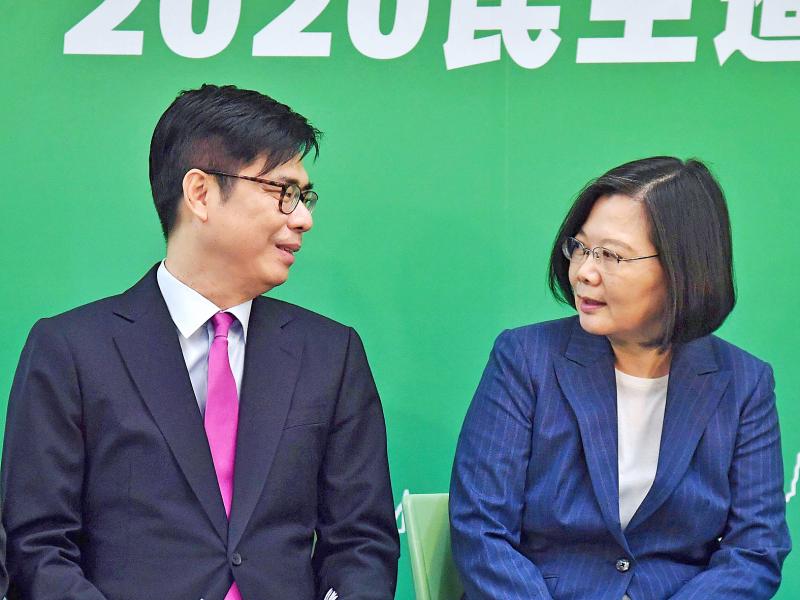The Democratic Progressive Party (DPP) yesterday confirmed that Vice Premier Chen Chi-mai (陳其邁) would be its candidate in the Kaohsiung mayoral by-election, as President Tsai Ing-wen (蔡英文) urged the party’s rank and file to support Chen’s campaign.
Tsai — joined by Chen, DPP Secretary-General Lin Hsi-yao (林錫耀), Tainan Mayor Huang Wei-che (黃偉哲) and Taoyuan Mayor Cheng Wen-tsan (鄭文燦) — made the announcement after a DPP Central Standing Committee meeting at the party’s headquarters in Taipei.
“Chen is a strong fighter, he is our party’s best candidate and the person most suitable for the job,” Tsai said, adding that Chen, who had been a long-time Kaohsiung resident and considers the city his hometown, had decades of experience in important local and central government positions.

Photo: CNA
Tsai said that she and Chen were shocked by the results of the Kaohsiung mayoral election in November 2018, which he lost to Chinese Nationalist Party (KMT) candidate Han Kuo-yu (韓國瑜).
“However, it taught our party a lesson: We must listen to Taiwanese and carry out reforms,” she said. “The residents of Kaohsiung are giving us the chance to take a make-up test — and we must stand, picking ourselves up from where we stumbled. We are determined to win not just for our party, but also for Kaohsiung — for new infrastructure and development.”
Chen said that he could provide the city with the leadership needed to reach a better future, bring it new hope and make true the party maxim: “DPP governance is quality assurance.”
“In the 2018 Kaohsiung mayoral election, I did not do enough, and the results let many people down. It was a big setback for me,” he said, “Now I want to return there, to work hard and fight together with the residents of Kaohsiung.”
Although born in Keelung, Chen grew up in Kaohsiung, and after completing a medical degree, he obtained a master’s in preventative medicine from National Taiwan University’s College of Public Health.
The 55-year-old was a DPP legislator for five terms and has also held top posts, such as DPP deputy secretary-general, Cabinet spokesman, Presidential Office deputy secretary-general and Kaohsiung deputy mayor.
After nearly 940,000 Kaohsiung voters cast their ballots to recall Han as mayor on June 6, a by-election to replace him was scheduled for Aug. 15.
Chen’s aides have organized a rally for tomorrow to launch his campaign and so that he can meet with Kaohsiung residents.
Chen said that his last Cabinet meeting would be today, which would allow him to say goodbye to colleagues and friends before going to Kaohsiung to focus on his campaign.
Executive Yuan spokesman Ting Yi-ming (丁怡銘) said that Premier Su Tseng-chang (蘇貞昌) had approved Chen’s resignation, effective tomorrow.
“In his resignation letter, Chen gave as reasons the opportunity to serve the residents of Kaohsiung and his decision to run in the by-election,” Ting said. “Premier Su approved Chen’s request and thanked him for his contributions during the COVID-19 outbreak and his handling of government affairs as vice premier over more than a year.”
Additional reporting by Lee Hsin-fang

The Central Election Commission has amended election and recall regulations to require elected office candidates to provide proof that they have no Chinese citizenship, a Cabinet report said. The commission on Oct. 29 last year revised the Measures for the Permission of Family-based Residence, Long-term Residence and Settlement of People from the Mainland Area in the Taiwan Area (大陸地區人民在台灣地區依親居留長期居留或定居許可辦法), the Executive Yuan said in a report it submitted to the legislature for review. The revision requires Chinese citizens applying for permanent residency to submit notarial documents showing that they have lost their Chinese household record and have renounced — or have never

A magnitude 5.6 earthquake struck off the coast of Yilan County at 12:37pm today, with clear shaking felt across much of northern Taiwan. There were no immediate reports of damage. The epicenter of the quake was 16.9km east-southeast of Yilan County Hall offshore at a depth of 66.8km, Central Weather Administration (CWA) data showed. The maximum intensity registered at a 4 in Yilan County’s Nanao Township (南澳) on Taiwan’s seven-tier scale. Other parts of Yilan, as well as certain areas of Hualien County, Taipei, New Taipei City, Taoyuan, Hsinchu County, Taichung and Miaoli County, recorded intensities of 3. Residents of Yilan County and Taipei received

Taiwan has secured another breakthrough in fruit exports, with jujubes, dragon fruit and lychees approved for shipment to the EU, the Ministry of Agriculture said yesterday. The Animal and Plant Health Inspection Agency on Thursday received formal notification of the approval from the EU, the ministry said, adding that the decision was expected to expand Taiwanese fruit producers’ access to high-end European markets. Taiwan exported 126 tonnes of lychees last year, valued at US$1.48 million, with Japan accounting for 102 tonnes. Other export destinations included New Zealand, Hong Kong, the US and Australia, ministry data showed. Jujube exports totaled 103 tonnes, valued at

BIG SPENDERS: Foreign investors bought the most Taiwan equities since 2005, signaling confidence that an AI boom would continue to benefit chipmakers Taiwan Semiconductor Manufacturing Co’s (TSMC, 台積電) market capitalization swelled to US$2 trillion for the first time following a 4.25 percent rally in its American depositary receipts (ADR) overnight, putting the world’s biggest contract chipmaker sixth on the list of the world’s biggest companies by market capitalization, just behind Amazon.com Inc. The site CompaniesMarketcap.com ranked TSMC ahead of Saudi Aramco and Meta Platforms Inc. The Taiwanese company’s ADRs on Tuesday surged to US$385.75 on the New York Stock Exchange, as strong demand for artificial intelligence (AI) applications led to chip supply constraints and boost revenue growth to record-breaking levels. Each TSMC ADR represents